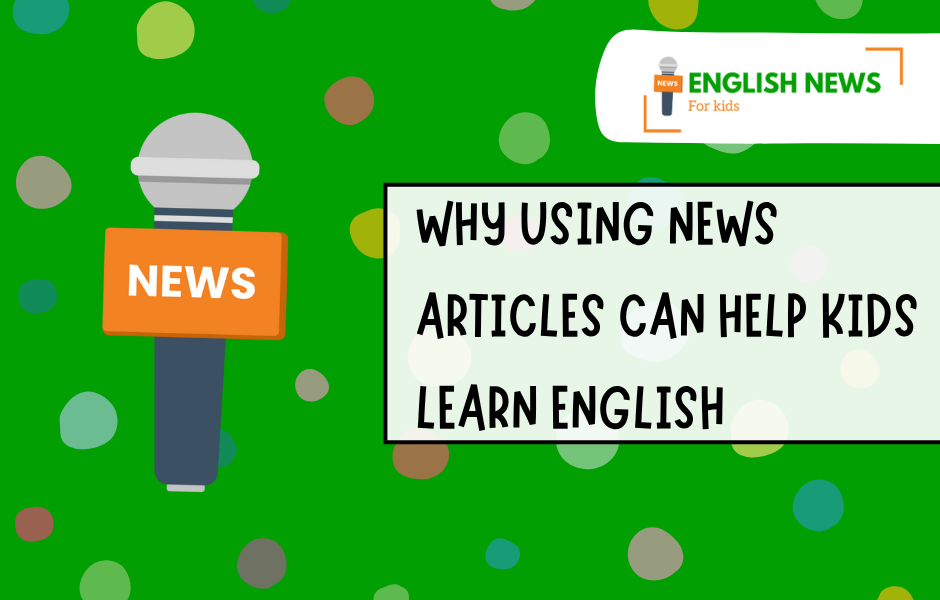
Learning English as a child can be interesting, easy and even fun when the materials are engaging and connected to the real world.
At English News for Kids, we believe that news stories are one of the best tools for helping children improve their English skills naturally and a great support for classroom learning.
By reading short, interesting articles written in clear, yet practical English, young learners can build vocabulary, improve grammar, and develop reading confidence. All while learning about topics they actually care about.
Let’s look at why using news articles can be a powerful way for children to learn English and how our platform supports that journey.
Why news articles help children learn English
Children often learn best when they’re interested in what they’re reading, something that makes them wonder “why?” and want to read the next line. That’s why short news stories and articles are such a powerful learning tool for English students.
The articles on English News For Kids are written in clear British English, specially designed to be engaging and understandable for ages 6 to 12, while introducing new vocabulary, phrases, sentence structures, and grammar techniques in a natural and fun way.
Learning a language requires a mix of approaches. Using the same style and the same tools over and over can become boring and make learning feel harder than it needs to. News articles help children bring together everything they learn in their English class – textbooks, grammar lessons, reading and writing practice – and see how it’s used in real life.
When kids read news articles, they learn about the world, current events, and different cultures. It opens their minds to new ideas and helps them imagine what their future could hold. It makes life, and the world, a more exciting place.
While it’s helpful for kids to know what’s happening in the world, the main goal of English News for Kids is to help English learners understand how the language works by learning through topics that genuinely interest them.
Our articles reflect real-world topics. From the latest tech and sports news to science and nature and world culture. These stories introduce vocabulary that’s useful and meaningful, and because the words appear in context, they’re more likely to stick.
Real stories, real language
Real stories help children connect new language to the real world. We’ve been teaching kids to learn English since 2017, and we speak to our students in a friendly, kind, and genuine way, like we’re speaking to people with real feelings, thoughts, and opinions. Because we are.
This is how we write our articles too.
We avoid unnatural language or overly simple phrases. Instead, our articles reflect the kind of language children will hear, read, and use in everyday life. We want them to feel like they are part of the conversation.
Take this article: Octopuses: The ocean’s clever shape-shifters. It’s interesting, surprising, and packed with everyday vocabulary, the kind children might hear in school, at home, or in books.
English vocabulary lists: learning new words in context
Every article on English News for Kids includes a vocabulary list. These aren’t just random words, they’re carefully chosen from the article to help students understand the whole piece.
Each word is explained in clear, child-friendly English.
A great way for students to use the vocabulary list is to read the article once, then review the words and their meanings. After that, they can read the article again to see how much more they understand.
Research shows that learning vocabulary in context is more effective than memorising lists.
It helps children understand not just what a word means, but also how and when to use it. That’s really the key – knowing a word without knowing how to use it isn’t very helpful.
Take a look at the vocabulary list in these articles:
Comprehension questions: learning through thinking
To help children understand what they read, we include comprehension questions with every article.
They are fun and useful.
Who doesn’t like a little quiz? Especially when it’s on an interesting topic you’ve just read about.
If the questions are a bit challenging, it shows the reader that they may need to spend more time with the article, reading through it again and looking carefully for the answers.
The questions in English News for Kids’ articles range from simple fact-checking to more reflective questions that encourage children to think about the concepts and ideas they’ve just read.
This active reading style supports better long-term learning and builds confidence.
You can see examples of questions at the bottom of these articles:

How curiosity helps language learning
One of the best things about news articles is that they feed children’s natural curiosity.
Many children will read for hours about topics that interest them. With our large selection of articles, and new ones added every day, it’s easy for English learners to find subjects they’re truly excited about.
When children want to know more about the world, like why we can’t live without trees, who won a big sports competition, or what on earth Cheese Rolling Day is, they’re more motivated to read.
Motivated reading equals better language learning. It’s that simple.
Stories we recommend for curious minds:
- Who was Tutankhamun? Secrets of the boy king
- Peregrine falcon chicks hatch at Ely Cathedral, Cambridgeshire
- Discovering silk: China’s tiny worm with a big secret
Explore our categories
We group all our stories into easy-to-navigate categories so parents, teachers, and children can quickly find topics they’re interested in, or discover something completely new.
News
In our News category, you’ll find kids’ articles about the latest things happening around the world. There’s a mix of everything here, as long as it’s recent. From people breaking exciting world records and conservation success stories to dangerous flooding, new inventions, and cool technology, this is where you’ll find up-to-date, real-world stories for curious kids.
Here are some of our News articles to start with:
- Mount Etna erupts again in Italy
- A whole new world: An elephant seal explores Cape Town’s streets
- The Everest Man does it again – 31 times on top of the world!
Science & nature
Our Science & nature section is perfect for curious kids learning English. Here, you’ll find a wide range of exciting articles that help explain how the world works. From fascinating animals and outer space to science experiments and the wonders of the natural world, there’s so much to explore.
Here are some of our Science & Nature articles to start with:
- Puffins return in record numbers to Skomer Island
- Floods hit Buenos Aires Province in Argentina
- Tree power! Why the world can’t live without them
Sport
Our Sports news articles for kids let children learn about popular sports in their own country, and around the world. Who won the football, tennis, cricket or table tennis? What happened at the latest big tournament or event?
Learn about your favourite games, teams, and sporting legends while improving your English along the way.
Here are some of our Sports articles to start with:
- Kabaddi! The fast, fierce game you’ve probably never heard of
- Get set for summer! The biggest sports events you can’t miss
- Paris Saint-Germain are the kings of Europe for the first time
Technology
Cool gadgets, big ideas, and how technology is changing our world, that’s what you’ll find in our Technology articles for kids. These English news articles explore everything from clever new inventions and space robots to AI tools and the latest tech trends.
Learn how technology helps people, solves problems, and even makes life more fun.
Here are some of our Technology articles to start with:
- What is artificial intelligence? A quick guide for kids
- Punch! Kick! Spin! Meet the fighting robots of China
- New contact lenses that help you see in the dark, even with your eyes closed!
Travel
Explore exciting places and unusual journeys with our Travel articles just for kids. Guides to interesting destinations, world landmarks, unique cultures, and incredible adventures. From busy and exciting cities to peaceful and remote islands, these stories help young readers learn English while discovering how people live, what they eat, and what makes each place special.
Perfect for curious minds, our Travel section brings geography, culture, and fun facts to life in easy-to-read English.
Here are some of our Travel articles to start with:
- A kids’ guide to Budapest
- Machu Picchu: The lost city in the clouds
- The Everest Man does it again – 31 times on top of the world!

Arts & culture
Explore creativity from around the world with our fun and engaging kids’ Art & culture articles. Discover fascinating festivals, different types of music, popular TV shows and films, and learn what life is like for children in other countries.
These stories bring cultures to life and inspire curiosity about the wider world.
Here are some of our Arts & culture articles to start with:
- A new Harry Potter TV series is coming!
- What’s inside the Pyramids? Let’s take a look!
- On This Day in 1897: Dracula was published
History
Yes, it’s true, history isn’t news, but remembering events that happened on specific days can be very useful. Learning about the past helps us understand the present and shape the future.
In our History section, you’ll find kid-friendly English articles about ancient ruins, world-changing inventions, significant events that occurred on this day in history, and much more.
Here are some of our interesting History articles to start with:
- Dragon boats, sticky rice, and ancient stories – Dragon Boat Festival
- On this day in history: HMS Titanic takes to the sea
- Music rewind: Discovering cassette tapes
Just for Fun
Funny, surprising, or just plain weird, these are the stories that make you smile.
As we mentioned before, using news articles to learn English works well simply because kids are reading about things they enjoy. Sometimes, all it takes is a bit of fun to get them interested and excited about English.
Here are some of our Just for Fun articles to start with:
- The amazing adventures of Amber the dog
- Weird Jobs! Would you eat pet food for a living?
- Helpful mice tidy sheds in the night
Must Read
We’d like to say every news article we write is created equal, but it’s simply not true. Some stories we just absolutely love and know our readers will too. These Must read articles may be taken from any of our other categories, as long as we love them enough.
Here are some of our Must read articles to start with:
- A kids’ guide to Paris
- Octopuses: The ocean’s clever shape-shifters
- Sun Safety Week: The sun is great, but we need to stay safe in it
Conclusion
News articles are more than just a source of information, they’re a powerful learning tool for children learning English.
At English News for Kids, we create articles that are both interesting and packed with everyday vocabulary. Our stories encourage children to read more, think more, and explore more, all while building solid language skills.
With vocabulary lists, comprehension questions, and topics that truly matter to young learners, our articles turn English practice into an adventure. So, whether your child loves animals, sports, space, or something silly, there’s a story here waiting to help them grow in confidence and curiosity.
Sinead is a writer and EFL teacher with eight years’ experience. She’s a native English speaker who loves making news stories fun and easy to understand for children around the world. Her passions include travel, animals, and helping to make the world a kinder, more sustainable place.



